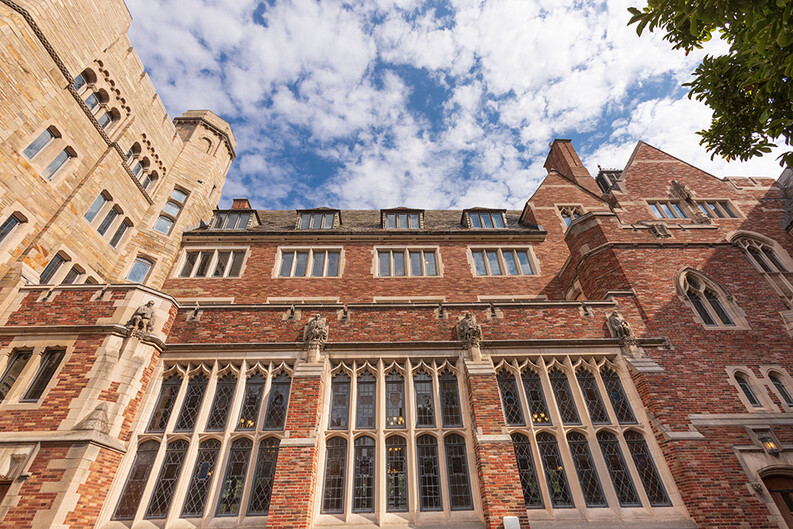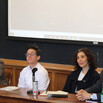Liman Center Awards 2024-25 Public Interest Fellowships

The Arthur Liman Center for Public Interest Law has awarded its 2024-25 fellowships, which include fellowships for Yale Law School graduates who will spend a year working on behalf of communities and individuals in need of legal services. With this latest group, more than 190 Yale Law School graduates have received Liman Fellowships.
Incoming Liman fellows will join organizations based in California, Connecticut, the District of Columbia, Illinois, Massachusetts, Michigan, and New York. Their areas of focus include conditions of people charged with crimes and released pending trials, problems faced by people who are incarcerated, police misconduct, subsidized housing, LGBTQ youth, and children with disabilities. Fellows’ areas of focus will also include expanding access to health care, advancing the rights of workers, and protecting the right to vote.
Three of the incoming fellows will hold specially designated fellowships. In 2017, in celebration of the Liman Center’s 20th year, former fellows helped to fund a Resnik-Curtis Fellowship to honor Judith Resnik, the Center’s Founding Director, and Dennis Curtis, Clinical Professor Emeritus and a pioneer in Yale Law School’s clinical program. In 2018, the Liman Center created the Meselson-Liman Fellowship in memory of Amy Meselson ’02, a former Liman Fellow who worked tirelessly on behalf of immigrant children. This fellowship continues through the generosity of her family, friends, and classmates. Since 2019, Alan Bersin and Lisa Foster have funded a Curtis-Liman Fellow to work in conjunction with the Liman Center and Yale Law School’s clinical program on issues of criminal law enforcement and immigration.
Incoming 2024-25 Fellows
Ryanne Bamieh ’23, the incoming Resnik-Curtis Fellow, will join the Public Defender’s Office in Santa Barbara County. Her work will mix representing defendants accused of misdemeanors and helping criminal defendants develop pretrial release plans. Of special concern will be the challenges faced by people who do not have housing. Before coming to Law School, Bamieh received her B.A. in history from Stanford University, and served as a Peace Corps education volunteer in Comoros. At Yale, she was a Coker Fellow and a member of the Immigrant Rights and the Challenging Mass Incarceration Clinics, and participated on Yale's Trial Advocacy Team. Bamieh is currently a law clerk for Judge Jacqueline Scott Corley of the U.S. District Court for the Northern District of California.
Gregory Briker ’24 will join the Institute for Constitutional Advocacy and Protection in Washington, D.C., where he will focus on appellate litigation related to misconduct of law enforcement officials. The goal of his project is to prevent reversals of lower court decisions granting remedies to victims of unlawful excessive force. Briker received a B.A. in history from Harvard University. At Yale Law School, he was a member of the Housing Clinic and an Editor of the Yale Law Journal. He has authored articles about social movement litigation and civil rights history.
Nathan Cummings ’23 will join the Shriver Center on Poverty Law in Chicago. His project focuses on supporting tenants leading efforts to improve living conditions in federally subsidized housing in Illinois. After earning an A.B. in history and literature from Harvard University, Cummings worked at a law firm that represented individuals with civil rights and wage and hour claims. While at Yale Law School, he spent five semesters as a member of the Community and Economic Development Clinic and served as a Forum Editor for the Yale Law Journal. He is currently a law clerk for Judge Rebecca R. Pallmeyer of the U.S. District Court for the Northern District of Illinois.
Ibrahim Diallo, the 2024-25 Curtis-Liman Fellow, will co-teach the Liman Workshop, collaborate with the clinical program, and work at the Office of the Federal Public Defender for the District of Connecticut. Diallo graduated from Trinity College in 2011 with a B.A. in International Relations and from Columbia Law School in 2020. In law school, he was named a Lowenstein Public Interest Fellow, founded an externship program for law students to work with the New York Taxi Workers Alliance (NYTWA), and won the Constance Baker Motley Prize, the Samuel I. Rosenman Prize for Academic Excellence in Public Law, and the Emil Schlesinger Labor Law Prize. After graduation, Diallo was a Staff Attorney with the NYTWA and clerked for Judge Victor Bolden of the U.S. District Court for the District of Connecticut. He is currently clerking for Judge Susan Carney of the U.S. Court of Appeals for the Second Circuit.
Ellie Driscoll ’23, the incoming Meselson-Liman Fellow, will join the Washington Lawyers’ Committee for Civil Rights and Urban Affairs in Washington, D.C. to represent youth with disabilities who are drawn into the criminal legal system. Driscoll will represent individuals who are in detention or under other forms of supervision; she will help them protect their rights to transition services, and will combat punitive legislation that expands youth involvement with the criminal legal system. Driscoll earned a B.A. in politics and American studies from Brandeis University. At Yale Law School, she was a member of the Legal Assistance: Immigrant Rights Clinic and the Challenging Mass Incarceration Clinic. Driscoll currently serves as a clerk for Associate Judge Catharine Friend Easterly of the District of Columbia Court of Appeals.
Jonathan Gibson ’24 will join the Roderick and Solange MacArthur Justice Center’s Supreme Court and Appellate Program in Washington, D.C. His project focuses on relying on state constitutions to limit the harms of solitary confinement. Gibson received a B.A. in American studies and computer science from Georgetown University. At Yale Law School, he has been a member of the Challenging Mass Incarceration Clinic and the Media Freedom and Information Access Clinic. He also worked as an Executive Articles Editor for the Yale Law & Policy Review, a board member for the Green Haven Prison Project, a student volunteer with the Federal Capital Habeas Project, and a research assistant.
Danny Haidar ’24 will join the Michigan Attorney General’s office as an Assistant Attorney General to focus on issues related to the 2024 election. That work includes monitoring election-related legal disputes occurring throughout the state and assisting parties who seek to protect electoral processes. He will also support the local attorneys who represent election officials throughout the state. Haidar earned his B.A. in philosophy, political science, and linguistics from Columbia University. At Yale Law School, he was Editor-in-Chief of the Yale Law and Policy Review and a Coker Fellow.
Charlie Jiang ’24 will join the Asian American Legal Defense and Education Fund (AALDEF) in Boston, Massachusetts, to enhance respect for the dignity of working-class Asian Americans, improve community safety, and combat structural racism. Jiang will represent people who have been attacked due to anti-Asian animus and contribute to legislative efforts to improve access to healthcare and other critical public services. Jiang received a B.S. in engineering physics from Stanford University. At Yale, he has been a member of the Community and Economic Development Clinic and an Articles Editor for the Yale Law and Policy Review.
Zoe Kreitenberg ’24 will serve at the ACLU of Massachusetts. Her project will seek to advance LGBTQ+ rights and free expression, especially for youth and students. She will conduct community outreach and aid litigation efforts to create safer, more inclusive communities and schools across Massachusetts. Prior to law school, Kreitenberg earned a B.S. in philosophy from West Point and led ballistic missile defense operations as a captain in the United States Army. At Yale, she is a Features Editor for the Yale Journal of International Law, a speechwriter, a research assistant, and a Ludwig Fellow.
Terin Patel-Wilson ’24 will join the N.A.A.C.P. Legal Defense Fund’s Prepared to Vote and Voting Rights Defender team in New York. His project focuses on protecting voting rights for all and ensuring access to the vote for communities of color in the South. His work will involve a combination of engaging community groups, local and legislative advocacy, and litigation. Patel-Wilson received a B.S. in computer science from Yale College. In Law School, he has been a member of the Housing Clinic and the Technology Accountability and Competition Project.
Continuing Fellows
With substantial support from host organizations, the Liman Center is able to extend the fellowship term for five Fellows to continue their work for a second year.
Yael Caplan ’23, at Pregnancy Justice in New York, works to limit efforts to criminalize decisions around pregnancy. During her first year, she helped represent individuals facing criminal charges for reasons related to pregnancy, filed suit on behalf of a woman who experienced egregious medical neglect during her pregnancy in an Alabama jail, and wrote amicus briefs in several cases. In the coming year, Caplan will continue this work while exploring modes of affirmatively protecting the autonomy and choices of people who are pregnant. Caplan holds a B.A. in public policy and comparative human development from the University of Chicago. At Yale Law School, she was a member of the Veterans Legal Services Clinic and an Articles Editor for the Journal of Law and Feminism.
Juan Fernando Luna León ’23 supports workers with UNITE HERE Local 11 in Los Angeles. During his first year, he focused on enforcement of an L.A. municipal ordinance, enacted in June 2022, that provides protection for housekeepers facing sexual assault and harmed by unfair business practices. Luna León helped prepare a class action complaint alleging that a hotel failed to comply with the ordinance's safety provisions. He has also done outreach to inform workers on L.A.’s Skid Row of their rights in the workplace. In the coming year, Luna León will expand his outreach to workers at non-union hotels and join in advocacy to use the L.A. ordinance as a model elsewhere in California. Luna León earned a B.A. in history from Texas A&M University. At Yale Law School, he was a member of the Workers and Immigrant Rights Advocacy Clinic, where he helped represent local unions and families separated by the U.S. government.
Wynne Muscatine Graham ’22 will spend a second fellowship year at the Roderick and Solange MacArthur Justice Center’s Supreme Court and Appellate Program in Washington, D.C., where she has worked on appeals related to solitary confinement. In the coming year, she will focus on litigation in state courts as well as on efforts to obtain reforms of solitary confinement through administrative changes by corrections departments. Muscatine Graham received a B.A. in philosophy from Harvard University. At Yale Law School, she was a member of the Rule of Law Clinic and worked with the Liman Center on its 2021 report on solitary confinement, Time-In-Cell. Prior to her Liman fellowship, Muscatine Graham was a law clerk for Chief Judge David J. Barron of the U.S. Court of Appeals for the First Circuit.
Katie Roop ’23 will continue at The Legal Aid Society’s Criminal Appeals Bureau in New York, where she has been helping individuals prepare for parole release determinations, drafting materials to enable attorneys and parole applicants to navigate the process, and representing people who are incarcerated in parole appeals. In contrast to many parole advocates focused on people with long-term or life sentences, Roop’s work in the coming year will focus on individuals with shorter sentences for whom fewer resources have been available. Roop earned a B.A. in political science and history from Washington University in St. Louis. At Yale Law School, she was a student director of the Strategic Advocacy Clinic and served on the Clinical Student Board and the board of the Civil Rights Project.
Rachel Talamo ’23 will continue her fellowship at Prisoners' Legal Services (PLS) of Massachusetts, where, through litigation, policy work, and organizing, she is contributing to efforts to establish independent and enforceable oversight over state prisons and jails. Her work has included class action litigation against the Massachusetts Department of Corrections for systemic brutality against people incarcerated at the state's maximum-security prison, as well as legislative coordination for a bill that would be the first in the nation to enforce its carceral oversight provisions through financial and personnel sanctions. In the upcoming year, Talamo will focus on litigation addressing harmful conditions of confinement and upholding the rights of individuals incarcerated in the state. Talamo earned a B.A. in American history and literature from Harvard in 2018. While at Yale Law School, she worked with Schell Center Executive Director Hope Metcalf to pass the PROTECT Act in partnership with Stop Solitary Connecticut. Talamo was also a member of the Challenging Mass Incarceration Clinic, a peer advocate, a National Lawyers Guild legal observer, and an Editor of the Proceedings of the Rebellious Lawyering Conference and the Journal of Law and Feminism.
Through the work of faculty, students, and fellows, the Arthur Liman Center for Public Interest Law aims to improve the ability of individuals and groups to obtain fair treatment under the law. Since 1997, the Center has launched hundreds of public sector legal careers, undertaken innovative research to generate meaningful change, and supported communities, in the hopes of contributing to a more just legal system.


